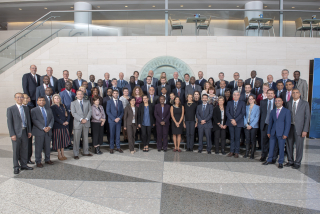Posted by Bruno Imbert and Jacques Charaoui[1]
The IMF’s Fiscal Affairs Department (FAD) hosted the fifth annual retreat of its PFM advisors in Washington DC from October 15-19, 2018. The event gathered together more than 40 advisors located either in the IMF’s Regional Technical Assistance Centers (RTACs) around the world, or in country positions, together with Washington-based staff. It provided an opportunity to discuss progress in implementing a wide range of PFM tools and reforms in the field, and to share experiences and good practices.
Support for capacity development (CD), which includes technical assistance and training, accounts for about 80 percent of the resources of FAD, a significant share of which is delivered by the two PFM divisions, M1 and M2 and their advisors in the field. This support—which has expanded greatly in recent years—helps beneficiary countries build capacity, develop skills, and implement reforms. The growth in CD-related work programs is reflected in:
- The expansion in the number of field-based PFM advisors providing advice on topics such as budgeting, accounting, treasury management, and macro-fiscal issues through the 10 existing RTACs,[2] two regional offices (Slovenia, and Thailand), and a large number of regional and country-based positions; and
- the increasing demand for CD worldwide, and the positive feedback received from member countries and donors. In FY2018, more than 280 missions on PFM topics were conducted by headquarters staff, long-term experts, and short-term experts.
In this context, the retreat provided an excellent opportunity to discuss a wide range of issues in a constantly evolving environment. PFM advisors in the field and headquarters-based staff benefitted from lively and deep conversations on:
- PFM issues emerging from recent analytical work[3] carried out in FAD such as infrastructure governance, the balance sheet approach to fiscal policy, gender budgeting, work on governance and transparency, and other PFM-related issues.
- How to respond more flexibly to countries’ requests for CD on an increasing range of PFM topics (e.g., public investment and PPPs, fiscal risk management, cash management, and public finance legislation). Countries’ call for support is frequently specific and targeted.
- How to respond best to demand from countries for data that compares their institutions and performance with regional counterparts and other countries, and to expand the use of peer learning techniques.
- How FAD can adapt its traditional methods of delivering CD to innovative methods and approaches.
Participants used the retreat to discuss how best to strengthen the effectiveness of CD delivery, and to interact and learn from each other. Recent publications such as FAD’s Fiscal Transparency Evaluation Handbook and the recently published Fiscal Monitor on Managing Public Wealth were showcased. Ideas on strengthening the network of cross-border collaboration were shared. Alternative approaches to delivering and providing CD were discussed, including:
- The use of technological tools such as Webinar to facilitate peer-to-peer learning on regionally-specific issues, and to conduct small and focused training workshops.
- Innovative ideas for regional workshops, such as the recent event organized by AFRITAC East in which a group of Budget Directors from the region discussed techniques for challenging the budget submissions of line ministries.
- How to improve awareness of the local environment and respond to institutional and political economy challenges, thus ensuring that PFM reforms and good practices are effectively implemented.
- How to increase dialogue with development partners such as the World Bank and the regional development banks, and with external stakeholders such as the International Budget Partnership and the PEFA Secretariat.
[1] PFM 1 and PFM 2 Divisions, Fiscal Affairs Department, IMF.
[2] AFRITAC West 1 (www.afritacouest.org) ; AFRITAC West 2 (www.afritacwest2.org) ; AFRITAC Central (www.afritaccentre.org) ; AFRITAC East (www.eastafritac.org) ; AFRITAC South (www.southafritac.org) ; METAC (www.imfmetac.org) ; PFTAC (www.pftac.org) ; CARTAC (https://cartac.org/) ; CAPTAC (www.captac-dr.org) ; and SARTTAC (www.sarttac.org).
[3] For example, Policy Papers, the Fiscal Monitor, IMF Working Papers, Technical Notes and Manuals, and How To Notes.
Note: The posts on the IMF PFM Blog should not be reported as representing the views of the IMF. The views expressed are those of the authors and do not necessarily represent those of the IMF or IMF policy.








